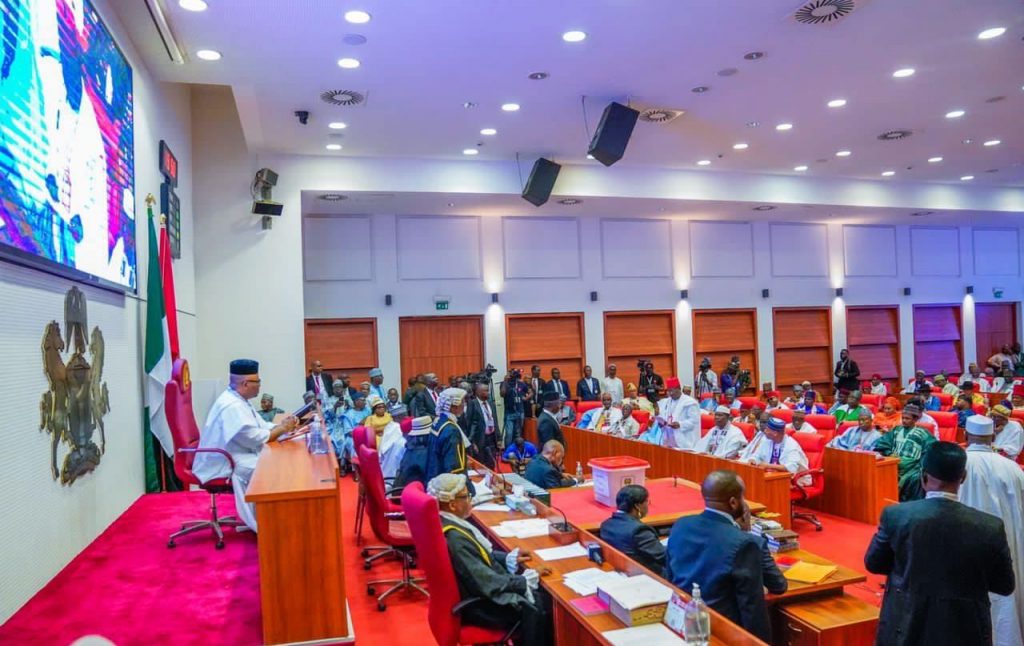Senate has passed the 2024 Nigerian Insurance Industry Reform Bill.
NewsOnline Nigeria reports that the Senate has passed the 2024 Nigerian Insurance Industry Reform Bill, designed to provide a comprehensive legal framework for the regulation and supervision of all types of insurance businesses in Nigeria.
This Nigeria news platform understands that the bill consolidates various existing laws governing insurance in the country, including the Insurance Act (2003), Marine Insurance Act, Motor Vehicles (Third Party Insurance) Act, National Insurance Corporation of Nigeria Act, and Nigerian Reinsurance Corporation Act.
ALSO: President Tinubu Gives Fresh Appointment To World Bank Specialist, Aisha Garba
One notable provision in the bill is the reduction of the minimum capital requirement for reinsurance businesses from N45 billion to N35 billion.
Titled the Nigerian Insurance Industry Reform Bill, 2024 (SB. 393), the legislation was read for the third time and passed after a clause-by-clause consideration during Tuesday’s plenary.
The bill’s passage followed the presentation of the report by the Senate Committee on Banking, Insurance, and Other Financial Institutions, chaired by Senator Adetokunbo Abiru (APC, Lagos East).
Presenting the report, Senator Abiru highlighted that the bill, read for the second time on July 18, seeks to modernize and consolidate Nigeria’s insurance laws to address contemporary challenges and foster growth within the industry.
Abiru emphasized that the bill’s goal is to create a robust legal and regulatory framework for the insurance sector, enabling it to contribute positively to Nigeria’s financial stability and economic growth.
“The existing rule-based supervision framework enabled by the current laws has become outdated. To make Nigeria a financial hub for Africa and one of the 20 largest economies in the world, there is an urgent need to adopt effective risk-based supervision within the insurance regulatory system,” Abiru explained.
During the public hearing, stakeholders expressed unanimous support for the bill, citing the obsolescence of existing insurance laws.
“All these legislations have surpassed the two-decade mark and lack provisions to address contemporary challenges or support growth and innovation in the industry,” Abiru noted.
He added that outdated laws have resulted in regulatory inefficiencies that hinder the industry’s ability to compete globally, underscoring the necessity for a thorough overhaul to improve Nigeria’s insurance sector’s international competitiveness.
Senator Jimoh Ibrahim (APC, Ondo South) argued against reducing the minimum capital requirement for reinsurance businesses to N35 billion, citing current economic conditions. He advocated for maintaining the status quo of N45 billion. However, his suggestion was not adopted during the Senate’s consideration of the bill.
After the bill’s passage, Deputy Senate President Barau Jibrin (APC, Kano North), who presided over the plenary, commended the committee for its efforts.
“This Act, once concurred by the House of Representatives and assented to by the President, will significantly reshape our economy,” Jibrin remarked.
He added, “Dynamic economies require legislative updates to align with contemporary realities. This reform restructures the insurance ecosystem to better serve Nigeria’s needs. I am confident the country will benefit from this law when it is implemented.”
The bill is expected to position Nigeria’s insurance sector for global competitiveness and contribute to the nation’s goal of becoming a $1 trillion economy by 2030.














